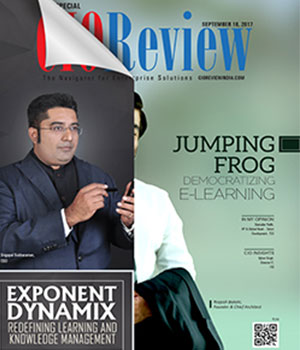
Why Artificial Intelligence will Empower the CIO
Gregory B. Morrison, SVP & CIO, Cox Enterprises | Monday, 25 September 2017, 10:39 IST
 Since the dawn of mainframe computing, CIOs have marshaled troves of data-gathering, using and protecting information to advance the company’s strategic objectives. As technology evolves, so do our methods. The widespread digitization of business has prompted CIOs to consider artificial intelligence (AI) for a wide range of applications, from HR to marketing, sales, finance and beyond.
Since the dawn of mainframe computing, CIOs have marshaled troves of data-gathering, using and protecting information to advance the company’s strategic objectives. As technology evolves, so do our methods. The widespread digitization of business has prompted CIOs to consider artificial intelligence (AI) for a wide range of applications, from HR to marketing, sales, finance and beyond.
Early adaptors like the financial services and insurance industries, tech and internet companies create disruptive new products and services based on AI or machine learning systems. AI is transforming the healthcare, auto, education industries and more.
Many companies, including Cox, think through how to use AI to automate tasks to reduce costs, increase productivity and offer our customers the best products and services possible.
To better anticipate where AI makes sense throughout organizations, let’s explore its potential.
A Better Crystal Ball
For years, most companies have relied on descriptive analytics to explain and describe outcomes, and apply that knowledge to future decisions. Awash with an unprecedented amount of data, successful companies go beyond descriptive analytics, harnessing the power of predictive analytics to assess and anticipate risks and opportunities. The smart CIO asks, how can we evolve our business and sidestep glitches with the right information, using the right technology?
AI goes beyond software that simply responds to input or behavior. True AI actually learns on its own. The more we use AI, the smarter it gets.
This is an exciting concept. In the future, we’ll use data to solve problems we don’t yet know exist. AI-based tools can help us recruit the best talent, protect the data in our HR and payroll systems and go to market. Earlier this year, we invested in Cox Media Technology (COMET), which uses AI to enhance our customers’ experience. It helps professionals throughout our enterprise—not just data and logistics experts—to find creative solutions.
Today, engineers, scientists and researchers are uncovering how AI and machine learning will change our lives.
Here are a few examples.
Hands Free AI
Ready to purchase a self-driving car? Automotive companies investing in autonomous vehicles hope so. Automakers add self-driving features to vehicles for those willing to pay for them. Soon everyday car-buyers will afford options that blur the lines between automated and manual driving. As technology advances and cultural acceptance grows, we will adopt driverless vehicles as a standard.
Infrastructure, regulatory and legal hurdles abound. Companies need to solve for safety and comfort. Through AI, their early prototypes will learn from experience. Vehicles will better recognize their surroundings based on sensory input. Just as new drivers become more intuitive drivers over time, so will our cars.
The industry has put AI applications to work in the industry in other ways. For example, Cox Automotive uses AI to help aggregate a massive amount of data collected during its simulcast car auctions. By implementing Splunk IT Service Intelligence (ITSI), which uses advanced analytics and machine learning, we can troubleshoot potential problems and support business decisions.
Saving Lives
Artificial intelligence is revolutionizing healthcare. According to Accenture, healthcare AI could potentially create hundreds of billions of dollars annually in the U.S. healthcare economy over the next ten years, both in administrative and clinical functions. Think robot-assisted surgery. Virtual nurses. Faster diagnosis. Surgeons use predictive modeling to create more customized implants. Biomedical engineers in the UK have even created a bionic hand that senses the shape of the object in front of it and directs the hand how to move in order to grasp it.
AI uncovers serious health issues. The same kind of neural networks that make it possible for Google and Facebook to recognize faces in photos can spot diseases on medical scans.
For example, AI identifies signs of disease on X-rays, including tuberculosis. AI tools draw from patient data, clinical insights and deep learning to find brain bleeds. Researchers in Houston developed AI software that quickly interprets mammogram results. The software uses natural language processing to assess imaging, patient data and pathologic breast cancer cues, which doctors use to assess cancer risk.
Cox Communications has invested in telehealth and home health solutions, and offers healthcare providers the ability to manage, share and synthesize patient records to make decisions about effective care.
The Next Best Thing
AI isn’t close to transforming our lives into an apocalyptic Steven Spielberg movie (and thank goodness). Machines cannot yet replace human flexible cognition, nor would we want them to. Nobody knows a perfect solution to security, privacy and workforce changes, because every application of AI calls for specific considerations for evolving and even unknown complexities.
What I know is that automating predictive analytics and streamlining our lives and work through AI is just the latest variation on an age-old theme. From the birth of large, consolidated computer systems, to the Internet, to bots, businesses have applied new technology to save time and resources and preserve as much valuable data as possible. We think back to those mainframes as clunky and antiquated.
In 20 years, perhaps we’ll consider this age of cloud computing as rudimentary. By then, we might possess the ability to—so to speak—squeeze all of the data from a cloud into one single drop.
Anything is possible.
CIO Viewpoint
IT DOES MATTER - The causes and costs of data...
By Upkar Singh, Director IT, FIS
Why Artificial Intelligence will Empower the CIO
By Gregory B. Morrison, SVP & CIO, Cox Enterprises
LMS - Present and Future Trends
By Milind Gokhale, VP–Technology and Learning Platforms, Tata Interactive Systems
CXO Insights
How Digital Learning helps Businesses Increase...
By By Saratchandra Panganamamula, Head of SAP HCM/SF Practice, YASH Technologies
What Could 5G Mean to the World of Enterprise?
By Danessa Lambdin, VP, Mobility Product Management, AT&T Business Marketing
Strategy & Execution for Healthcare Analytics...


.jpg)





